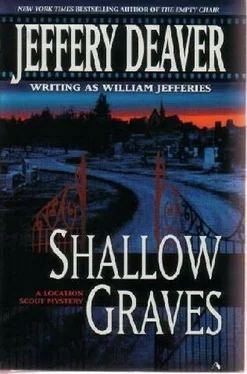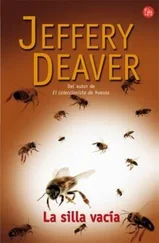For a time, after he started scouting, Pellam had wondered why this always happened. Why people talked to him as much as they did, bared their hidden secrets and passions. Priests didn't hear the kinds of things Pellam heard. Then he realized it wasn't so much that he was a good listener; it was that he was safe. They could spill their guts and he'd be gone in a week or two. Their secrets with him.
"I knew you didn't have anything to do with Sam," she said. "I really did." The words were halting. Women are usually better apologists than men. But Meg wasn't.
"What're you going to do?" he asked.
"I'm going to stop seeing him, my lover."
"Is that what you want to do?"
"It's what I have to do…" She looked at her watch. "Pellam, can I ask a favor?"
He didn't think it was going to involve freckles on her chest or anywhere else. He'd given up on that. He said, "Sure."
"Keith's going to be working all day. But Sam'll be home in a while. Could you stay around here? Did you have any plans?"
"Nothing to speak of."
"Would you? We could all have Sunday dinner. Maybe you could do some shooting with Sam. He's got a.22 and a little.410 shotgun we gave him last year."
Pellam said, "I'd love to."
"Really?"
"Really."
Then she was smiling like a sassy schoolgirl. She looked at her watch. "We've got an hour before I pick him up. There's something we could do together-just you and me."
Where was this leading?
She took his hand and pulled him toward the door.
"Where're we going?" he asked.
"Raking leaves."
"Are you serious?"
She pulled him outside. "Sure, come on. It's fun."
"I haven't raked leaves for twenty years. They don't have leaves in L.A. And even if they did, I wouldn't rake them."
He resisted at first. But here she was, a beautiful woman with whom he'd shared secrets. And so he said, "I guess."
He paused on the back porch. Looked out on what must've been four or five acres of colored leaves. She tossed him a rake.
He studied it for a moment. Then said, "I don't know how it works."
The glint of light caught the deputy's eye.
He pulled the Plymouth squad car off the road and eased it into the late-morning shade of a sugar maple, scarred from past years' syrup spigots. He climbed out of the car, pulled his lavender-tinted sunglasses on and began walking through the tall grass and forsythia whips. He'd lived in and around Cleary all his life and knew the customs and routines-where people tended to be and when you could expect to see them there and when you couldn't.
And one place you didn't expect to see a car parked was in this field on Sunday morning.
He climbed over what was left of a low stone fence and walked through a row of more maples to a narrow dirt road that led into some woods and just stopped about halfway through.
The car was parked exactly in the center of this road. The deputy paused twenty yards away and looked at it. A cheap Nissan. White. New York plates and a Cleary Tigers bumper sticker. The reason he stopped wasn't because he was noting all these details. He stopped because he didn't want to see what was in the car.
Figuring he'd deduced what had happened. Two high schoolers had spent their last hours on earth making out only to doze off and die, thanks to a bum exhaust pipe. That was the only possible reason anyone would park on this road on Saturday night and the only reason anyone would still be here now.
He took a breath to calm his stuttering heart and walked forward. He found out that he was wrong. There was another reason a car was parked in the middle of this deserted road. Because the driver had been murdered.
The boy had been shot three times in the chest with a small-caliber gun. His face was serene and there was hardly any blood on the body. Which meant he'd died quickly. The boy's face was pressed against the passenger window, away from the deputy, and his hand gripped the door handle. There was no lividity-sinking of the blood to the lower extremities of the body. This meant that he'd died recently.
Damn. His heart sank. The deputy walked around to the other side of the car and looked at the face. He recognized Ned Harper. A high school boy, a football player and, he believed, a one-eighty-division wrestler. He'd remembered that he'd seen Ned's father driving the Nissan around town. He wondered why the parents hadn't phoned him in missing. Maybe when your son was an eighteen-year-old football player, you assumed he'd be out late and didn't start to worry for a day or two. The deputy's daughter was two years old and he worried about her constantly. He didn't think there'd ever come a time when he didn't.
Who'd do something like this?
Maybe the boy'd picked up a hitchhiker. Maybe an escaped prisoner from Sing-Sing down in Ossining. But then why would he leave the car? Maybe it was an accident. He'd been hunting with a friend, the gun went off and the other boy panicked. But, no, the deputy realized. That couldn't be it. Not with three separate wounds.
He walked in a slow circle, looking for obvious clues, but he knew the sheriff would take charge of that and call the county in too. Then he realized he was just stalling, not wanting to make the call to report it.
The sun shot off the slanted window, a dove called from deep in the moist forest. The deputy walked slowly back to the car, praying he wouldn't be the one elected to tell the boy's parents.
At four-thirty Pellam remembered Janine. "Oh, hell."
Sam looked up. Probably thinking that he'd pointed the muzzle of the single-shot, break-action shotgun the wrong way or hadn't remembered one of the firearm safety rules Pellam had told him.
For the past couple hours they'd been plinking away with shotguns. Occasionally Pellam would throw a can or two into the air and Sam, sweating with the effort, would calculate the lead. Pellam noticed the determination on the boy's face. Once he overheard Sam mutter something as he fired.
"Ned" was what it sounded like. Pellam had asked him what he'd said but he just shook his head and said, "Can you throw another one please?"
"Got to call it quits, son," Pellam now said. "I've got an errand back in town."
Inside the kitchen Sam said, "Mom, you should've seen me."
"I did. I was watching out the window."
"How'd I do, Mr Pellam?"
"Did good, really good," Pellam said. "You've got to clean your weapon, Sam. But I've got to run to town. We'll do it when I get back." He looked at Meg and there must have been something in his words or-goddamn it, was he blushing? He looked at her coy smile and said, "You mind dropping me in town and I'll bring the camper back?"
"Hey," Sam said, his high voice cracking into an even higher register. "Can I come?"
Meg smiled sweetly, "Oh, and can I come too?"
"Probably better if you didn't."
She let him swing for a minute then said, "Maybe you've got some other friends in town. Some people I don't know."
"Shouldn't take more than fifteen minutes."
Meg smiled innocently. "Fifteen? That's pretty fast."
He gave her an exasperated glance.
The phone rang.
Meg kept her eyes on Pellam as she made a slow turn and walked to it.
"Hi, hon… Aw, no. Come on. What? Problems?"
"Hi, Daddy!" Sam shrieked, jumping for the phone. "I shot a hundred cans…"
Meg winced and waved him down. "I'm making a roast. You can't make it?" She sighed. "Okay. All right. We'll save some for you. Love you."
"Bye, Daddy!"
To Pellam she said, "He's in a bind at the plant. He's got to work most of the night. Sunday, can you believe it? He said he'll be back at eleven… So we eat a trois." Sam said, "What's that, Mom? Sounds yucky."
"It means there'll be three of us for dinner."
Читать дальше












